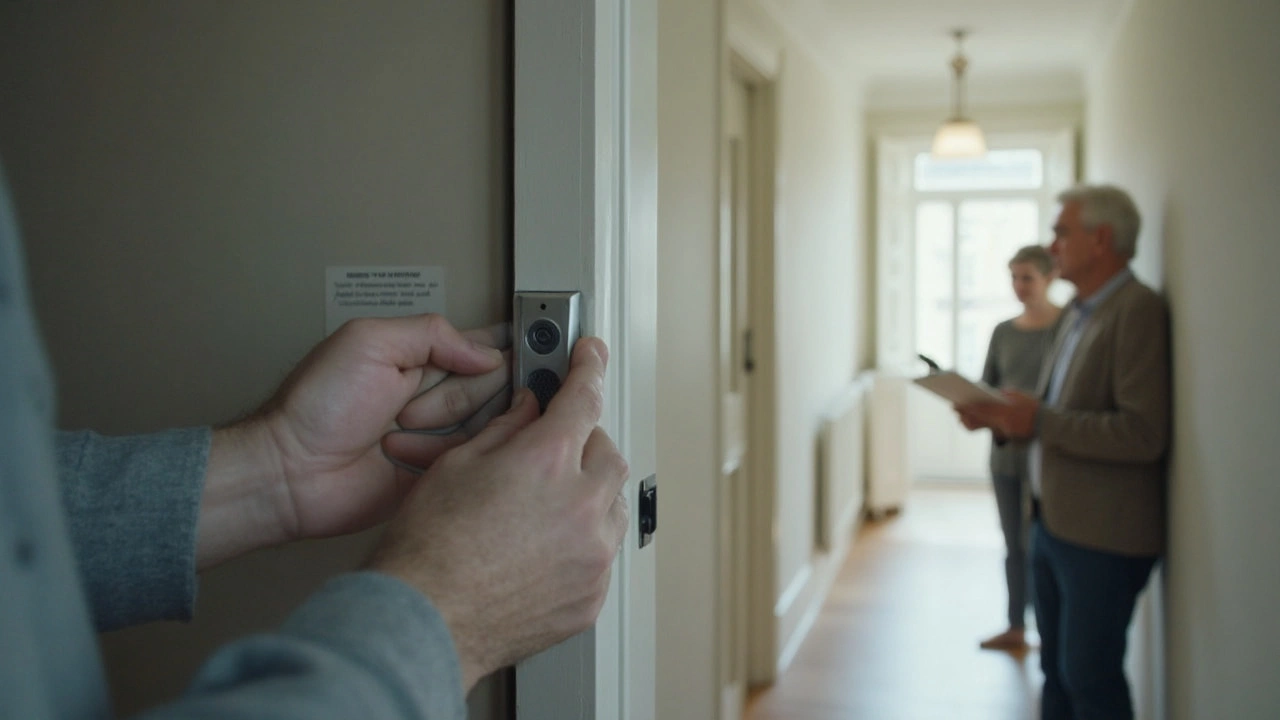Ever wish you could see who's at your door without facing the awkward hallway encounter? That's where a Ring doorbell comes in handy, even if you live in a flat. But before you rush to buy one, the rules aren't exactly straightforward, especially in the UK.
First thing to know: just because smart doorbells are everywhere in houses, it doesn't mean you can always stick one on your flat door. Leasehold contracts, landlord rules, and building management policies can throw a spanner in the works. The last thing you want is spending £100 on a shiny new gadget only to be told to yank it off a week later.
There’s also the privacy angle. In shared entrances, pointing a camera at a communal hallway or front door can get tricky—to stay legal, you have to be super careful about what (and who) you're recording. It’s not just about being polite, either: if you accidentally film common areas, you could be breaking data protection laws.
So, before you hit checkout, you need to do some homework. Double-check your lease, chat to your landlord (or managing agent), and have a quick scan of building rules. It might sound like hassle, but it saves you tons of grief and awkward conversations with neighbours down the line.
- Are Ring Doorbells Allowed in UK Flats?
- Checking Your Lease, Landlord, and Building Rules
- Installation Tips and Common Pitfalls
- Privacy, Neighbours, and the Law
- Best Smart Doorbells for Flat Dwellers
Are Ring Doorbells Allowed in UK Flats?
If you’re living in a block of flats, the simple answer is: it depends. There isn’t a single rule in the UK that says you can’t have a ring doorbell if you live in a flat, but there are quite a few roadblocks you might run into. Most of these come down to three things—your tenancy agreement, who owns your flat (you or a landlord), and the building’s rules.
Flats come with shared spaces like hallways and main doors. That’s where it gets sticky, because putting a video doorbell on your front door might mean you’re recording areas that other people use. This can lead to problems with building management and even break privacy laws if you’re not careful. There’s no law that bans smart doorbells in UK apartments, but the law does say you can’t record people in public or shared spaces without a good reason.
In 2023, the Information Commissioner’s Office (ICO)—the UK’s privacy watchdog—said that video doorbells can only film what’s “necessary and proportionate.” If the camera covers a bit of communal hallway or points at a neighbour’s door, you could get complaints or even legal trouble under data protection rules.
Building management companies are also getting stricter. In some London developments, only about 35% let tenants install video doorbells (according to a 2024 survey by Which?). The rest either ban them flat out or have tough rules about camera angles, sound recording, and even the colour of the device.
Buy-to-let landlords and housing associations are even more wary, because if your camera picks up the wrong area they could get a letter from the ICO. Some landlords are fine as long as you agree to take it down when you leave and fill any holes. Others refuse completely, especially in older buildings where anything attached to doors counts as a “modification.”
| Flat Situation | Ring Doorbell Allowed? | Extra Requirements |
|---|---|---|
| Privately owned, no building rules | Often allowed | Check for communal area filming |
| Rental, private landlord | Depends on landlord | Permission often required |
| Housing association or council | Rarely allowed | Usually not permitted |
| Shared entrance/main door | Usually not allowed | Breaches privacy and building rules |
Bottom line? Don’t just buy and hope for the best. Always double check what’s allowed in your specific flat, or you could end up wasting your money—or facing some very annoyed neighbours.
Checking Your Lease, Landlord, and Building Rules
If you’re living in a flat in the UK and keen to fit a ring doorbell, always start by checking your lease. Most leases for flats, especially leaseholds, have strict clauses that cover what you can and can’t do to the outside of your front door and any shared areas. Even if you own your flat, the communal bits (like hallways and external doors) are usually controlled by the freeholder or management company.
Private tenants have to go one step further—always ask your landlord for written permission before making any changes, even mounting a smart doorbell. Some landlords simply won’t allow anything screwed or stuck to the door, especially if it could damage the paint or wood. Loads of landlords prefer sticking to the rules to keep the building looking tidy and avoid neighbour squabbles.
Got a housing association flat? You’ll probably need permission from both the association and the managing agent. Some have clear rules forbidding extra cameras or tech on doors in communal areas. If the door is classed as a fire door (which is common), literally nothing can be bolted or screwed onto it—that’s a safety law, not just a preference.
Here’s what to double-check before you buy anything:
- Does your lease mention rules about 'alterations' or 'security devices'?
- Are you allowed to make changes to your flat’s external door?
- What’s your building’s policy on recording cameras?
- Is your front door a fire door?
- Do you need permission in writing, or is verbal approval enough?
And if you’re wondering how many people bump up against these rules: according to a 2024 survey by Shelter, about 40% of private renters said landlord approval was the biggest obstacle when wanting to fit smart devices in their flats. Building management was the second most common issue.
| Common Rule | Where It Applies | What It Means For You |
|---|---|---|
| No changes to front door | Leasehold, rental | No smart doorbells screwed or stuck |
| Permission needed for new devices | Leasehold, housing association | Written landlord or agent approval needed |
| No cameras in communal spaces | Nearly all flats | Can't point the camera at halls/lobby |
| No changes to fire doors | Any flat with fire doors | Don’t touch the door at all |
So, always get clear answers, preferably in writing. Even those small WiFi peephole cameras or no-drill smart doorbells can spark trouble if a neighbour or building manager complains. Better safe than sorry—your next step after getting permission is picking the right smart doorbell that works for flats, but more on that later.

Installation Tips and Common Pitfalls
So you’ve checked the rules, got your landlord’s green light, and you’re ready to install that Ring doorbell. Here’s where a few simple choices will save you a world of headaches later.
First, let’s talk about door types. Most flats in the UK have solid fire doors—drilling into these is a massive no-go in most buildings. Not only will you upset the building’s fire safety (and possibly void insurance), but you could be hit with a repair bill. That’s why most people living in flats go for adhesive mounts. Ring’s official No-Drill Mount is made just for this. Stick it on, and you’re good to go.
Wireless doorbells are the way forward for flats. Forget hardwiring—flats rarely let you tamper with communal electrics. A battery-powered unit is way easier to put up, swap out, and take with you if you move.
- Measure your doorframe. Most smart doorbells need a flat surface at least 10cm wide. Measure twice so you’re not stuck returning your kit.
- Mind the peephole! Don’t cover security peepholes or shared building numbers—most leases require these stay visible.
- Limit the camera’s field-of-view. Modern Ring doorbells have wide-angle lenses, so be ready to tweak the placement so you’re not snooping on neighbours.
- If your front door opens straight onto a corridor, angle the camera inwards to catch just your doorstep. This avoids privacy drama and keeps you out of trouble.
Sticking your ring doorbell on shared walls or outside your own flat’s entry door? Check with neighbours and the building manager first—half the building can see your device, and some folks get twitchy about that.
Wi-Fi speed causes most Ring problems. In a block, thick concrete walls and everyone fighting over bandwidth can kill your video feed. Before you buy, run a speedtest by your door. Ring says you need at least 2Mbps upload for smooth video. Any less, and you’ll get laggy or unreliable footage.
| Model | No-Drill Mount? | Battery-Powered? | Minimum Wi-Fi Needed |
|---|---|---|---|
| Ring Video Doorbell 4 | Yes | Yes | 2 Mbps upload |
| Ring Wired Doorbell | No | No - Wired only | 2 Mbps upload |
| Google Nest Doorbell (Battery) | Yes | Yes | 2.4 GHz Wi-Fi |
Final tip: keep a spare battery charged. Flat dwellers often forget, but you can’t just pop outside to charge it if your door locks behind you.
Privacy, Neighbours, and the Law
So, you’re probably wondering: can I even point a camera at my flat doorstep in the UK without accidentally turning into Big Brother? Here’s where things get real. As soon as your ring doorbell records anything outside your own front door or catches anyone else in a shared hallway, you step into the world of data protection laws—specifically, the UK’s Data Protection Act 2018 and the UK GDPR.
Recordings from your smart doorbell that include people who aren’t part of your household—say, neighbours or delivery drivers—are covered by these rules. This means you become what’s called a ‘data controller’. Sounds fancy, but it basically means you have to keep people’s privacy in mind or you risk complaints, fines, or being ordered to remove your camera.
Here are the big things to look out for:
- Don’t point the camera at communal spaces: Only aim the lens at your own doorway or the immediate area you need to monitor. Filming hallways, shared landings, or other people’s doors can get you in hot water.
- Let people know you’re recording: Put up a small sign or sticker near your door letting folks know there’s a camera. Not everyone reads the news; a heads-up is both polite and keeps you on the right side of the law.
- Don’t keep videos forever: Only store recordings as long as you have a good reason—like settling a theft or delivery issue—then delete them. Keeping videos just in case isn’t allowed.
In 2023, the Information Commissioner’s Office (ICO) said they’d seen a 40% rise in complaints about smart doorbells. Most were from neighbours upset that cameras were recording parts of shared areas. That means people really do notice—and complain—if you overstep.
Here’s a quick reference table to keep the main legal points straight:
| What You Can Do | What You Can’t Do |
|---|---|
| Film only your own doorway | Film entire hallway or neighbour’s doors |
| Let people know you’re recording | Keep it secret from neighbours |
| Delete footage you don’t need | Store everything forever |
If a neighbour complains, building management or the ICO could get involved. You could be asked to move the doorbell, delete footage, or even face penalties. So, keeping things respectful and transparent from the start is your safest bet.

Best Smart Doorbells for Flat Dwellers
If you're living in a UK flat, picking the right smart doorbell is all about staying low-key but still getting that peace-of-mind. Not every model is a good fit for a communal building. You need one that respects privacy, is easy to fit (or can be put up without drilling holes), and works well on shared front doors.
Let’s look at some top picks that tend to work for UK flats:
- Ring Doorbell (the keyword star here) – The Ring Video Doorbell (2nd gen or Wired) is simple to set up and loads of UK renters use it. The battery versions stick right onto your door—no wiring needed. The 2024 Wired model is small and less intrusive, which makes it a hit for flats with fussy management.
- Eufy Video Doorbell – Doesn’t require a monthly subscription if you want local storage. Battery-powered versions need no wiring, and you can set up tight motion zones to avoid filming the whole hallway. Lots of reviewers on Amazon UK say it’s “ideal for flats.”
- Google Nest Doorbell (Battery) – Works wire-free and can be fixed with adhesive mounts (double check your door’s surface though). It has clever AI for package and person alerts, and you can tweak privacy zones to avoid catching your neighbours coming and going.
- Arlo Essential Video Doorbell – This one works via Wi-Fi and battery. It gives a tall, head-to-toe video, so you catch parcels on the mat but you can set clear boundaries so you’re not snooping on the shared space.
Right, here’s a quick head-to-head comparison to help you make up your mind:
| Model | Battery/Wired | Local Storage | Custom Privacy Zones | Adhesive Mount Option | Monthly Fee Needed? |
|---|---|---|---|---|---|
| Ring Video Doorbell (2nd Gen) | Battery or Wired | No | Yes | Yes | Optional for video history |
| Eufy Video Doorbell 2K | Battery or Wired | Yes | Yes | Yes | No |
| Google Nest Doorbell | Battery or Wired | No | Yes | Yes | Optional for history/AI |
| Arlo Essential Doorbell | Battery or Wired | No | Yes | No | Optional for extra features |
Battery models are way easier to install in a flat since you don’t have to mess with the building’s wiring. Also, for most rental flats, sticking with doorbells that can be removed without any lasting marks is a life-saver when it’s time to move out. Double-sided adhesive pads are super popular among renters—just make sure the mount is solid for UK weather (and delivery people who don’t always go easy on your doorbell).
Here’s a tip: When you’re setting up your camera’s privacy zones, go for a narrow view that only covers your door and your doormat. Aim to cut out as much of the hallway or communal space as possible. This keeps you within the law and avoids any gripes from your neighbours.
"For people in flats or rented properties, a battery-powered doorbell often makes the most sense—they avoid wiring headaches and can be taken with you when you move," says Faisal Rana, tech writer at Expert Reviews UK.
Last thing—recording or livestreaming beyond your own doorstep can be a GDPR headache. Choose a doorbell that lets you tightly control what’s recorded and be ready to prove if anyone asks what you’re capturing and why. The right ring doorbell or similar smart model in a flat is all about balance: keeping yourself safe, not annoying your neighbours, and keeping the landlord sweet.

